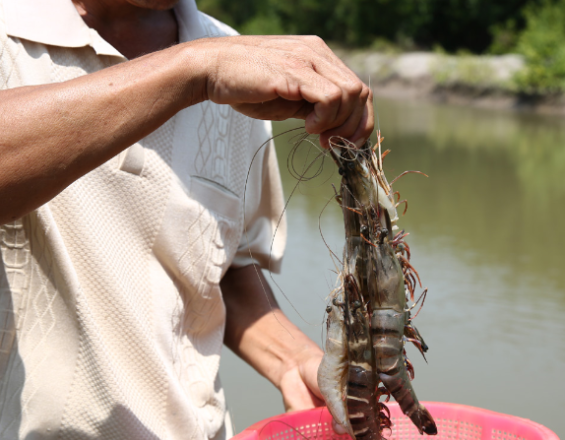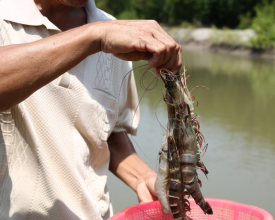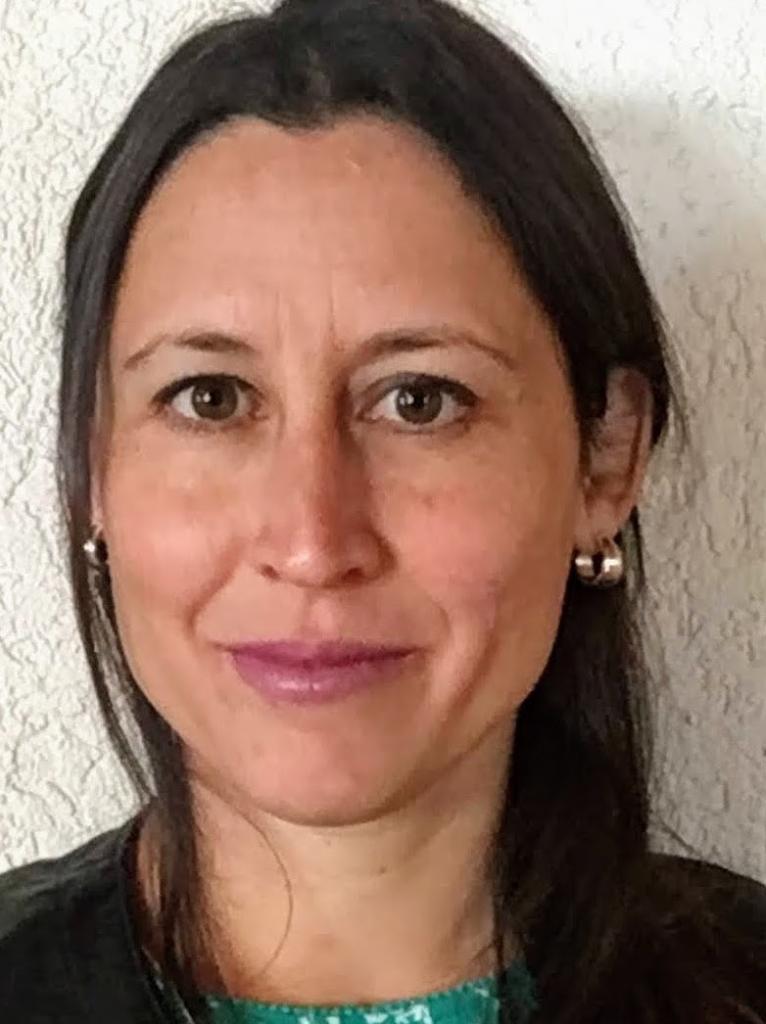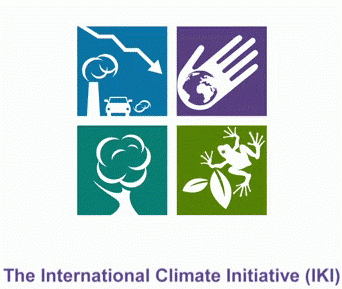
Shrimping Horizons: How Shrimp Farmers are Saving Thousands of Hectares of Mangroves in Vietnam

Over the last three decades Viet Nam has lost most of its mangroves, primarily due to the expansion of shrimp farming, a major contributor to its economy.
To help the Vietnamese government address the issue, IUCN and Dutch NGO SNV Netherlands Development Organisation implemented the Mangroves and Markets project (funded by the International Climate Initiative) in Cà Mau, to help shrimp farmers get organic certification under the Naturland, EU Organic, and other organic labels.
The certifications require at least 50% mangrove cover per farm. Farmers can then sell certified shrimp to the Minh Phu Seafood Corporation at a premium price. The project also supported Cà Mau in piloting a Payment for Ecosystem Services system and policy, requiring seafood companies to pay farmers an incentive of VND 500,000 (£17.77) for mangrove conservation and restoration per hectare for providing ecosystem services.
The success of the project has led to its replication in Ben Tre and Tra Vinh provinces.
Context
Challenges addressed
- In recent decades, Viet Nam has lost most of its mangroves, primarily due to the expansion of shrimp farming, a major contributor to its economy.
- The loss of mangroves is problematic as healthy mangroves make important contributions to both climate change adaptation and mitigation.
- The loss of mangrove ecostems also means less natural habitat for aquatic and terrestial species, and fewer livelihood options for local communities.
Location
Process
Summary of the process
For this particular project, organic certification allows for mangroves to be protected and restored, and enables farmers to fetch a premium price for their catch, thanks to Minh Phu Seafood Corporation’s involvement in the project.
Providing incentives is the key here. The shrimp farmers have an incentive to conserve and restore mangroves and obtain organic certification, and Minh Phu Seafood Corporation is able to export the organic shrimp to the European market, thus expanding their market reach.
The project also successfully supported Cà Mau in piloting a Payment for Ecosystem Services (PES) system. This system provides farmers with an additional incentive for mangrove conservation and restoration, by paying farmers an additional 500,000 VND (£17.77) per hectare of mangrove for providing ecosystem services.
For such an initiative to be successful, it is important that trainings are provided to most stakeholders involved, including the farmers and shrimp processing companies.
For this project, Minh Phu also invested in its own Internal Control System team, a supply chain from farm to factory, and financial incentives for collectors, collecting stations, and payments to support the FMB with monitoring.
Building Blocks
Education and training for farmers on organic shrimp certification
In order to obtain organic certification, farmers require training on installing and using toilets with septic tanks, and household waste management. Co-financing the provision of toilet kits and the replanting of mangroves in shrimp ponds are also required during a pilot demonstration.
Not only do farmers need to be trained, but forest protectors also need to be trained on applicable new technology for mangrove management and protection in order to monitor and audit the contracted mangrove cover. From 2013-2017, the project organised regular training to help transform the forest management system of the Forest Management Boards from one that relied on manually drawn cadastral maps and field measurement to one that is based on digital maps, using remote sensing, GIS, and GPS measurement and monitoring systems.
The project also needs to provide shrimp processing companies with training to establish and maintain Internal Control System teams. This training helps the companies to establish organic farming auditors and monitoring teams of their own. These teams are required to support and supervise the organic farmers over large areas to meet the standard for organic certification.
Enabling factors
- Financial investment in education and educational resources.
- Scientific and technical expertise to develop education programmes for certification.
- Incentives for farmers to be trained and certified.
- Support from local government, especially the forestry sector, to organise much of the training.
Lesson learned
- Training must not be a one-off training, but a series of training and retraining each year. Farmer awareness must be built gradually.
- Convincing farmers to participate in the initial training is the most difficult as they often have difficulty in understanding the idea of organic farming, and some of the required changes in farm practice goes against their common knowledge.
- Support from local authorities, especially the forest management boards are crucial.
Incentives to conserve and restore mangroves through organic shrimp certification
The Naturland standard requires each farm to have at least 50% mangrove cover while other organic standards require strict compliance with forest policy. Farmers who can demonstrate compliance then have the option of selling their certified shrimp to the Minh Phu Seafood Corporation, Viet Nam’s largest shrimp exporter.
The project also successfully supported Cà Mau in piloting a Payment for Ecosystem Services (PES) system. This system provides an incentive for mangrove conservation and restoration by paying farmers an additional 500,000 VND (£17.77) per hectare of mangrove for providing ecosystem services.
Besides payments for farmers, Minh Phu also invested in its own ICS team, a supply chain from farm to factory, and financial incentives for collectors, collecting stations, and payments to support the FMB with monitoring.
In this PES system, the processor pays the farmers for the ecosystem goods and services they provide, and mangrove cover is monitored by a third-party. This direct payment approach has been accepted by Ministry of Agriculture and Rural Development.
The project has also encouraged other processing companies to establish their organic farming area with different payment schemes, these companies include Seanamico, Seaprimexco in Ca Mau.
Enabling factors
- Existence of international certification standards
- Market demand for certified products
- Multi-sector collaboration
- Investment and funding
- Experience in PES concepts
- Policy support from local government
- Support from other projects of IUCN and SNV, technically and financially to fill in some gaps of the project
- Commitment of Minh Phu seafood Corp without upfront turnover from the organic shrimp
Lesson learned
- A Payment for Ecosystem Services (PES) works when the processor and ultimately the international consumer of organic shrimp are the buyers of the ecosystem services. The farmers themselves cannot be the purchasers of the services, as they would be both buyer and seller of the same services;
- A PES based on organic certification with a direct payment system between the shrimp processor and the farmer and an independent third-party auditor is more efficient than a proposed alternative indirect payment system of shrimp processors paying into a forest development fund;
- Although scientific calculations have shown that the PES value of mangroves is 10 times higher than the current amount being paid to farmer, the actual incentive must be set at the level that is viable for the seafood processor and consumer. This is balanced against the profit-based incentive for the farmer to maintain the forest cover.
- The distribution of incentive payments must be clear and transparent, and carefully supervised, thus the participation of local government is critical.
Impacts
By the end of the first phase of the project, over 2,000 shrimp farmers were trained in certified organic shrimp production. Of these, over 1,000 farmers, managing 7,000 hectares of integrated mangrove-shrimp, had signed contracts to maintain 50% mangrove cover and over 500 farmers had been certified using the Naturland organic standard.
The first phase of the project received awards from the Cà Mau government for helping the province meet its socio-economic and environmental goals.
The project is also supporting Cà Mau Provincial Peoples Committee to pilot Decision 111 to regulate organic shrimp projects in the province. This decision was issued in 2016 and is being monitored by the Vietnam Administration for Forests as a pilot model of direct Payments for Ecosystem Services for aquaculture.
As of June 2018, the project has trained over 5,000 farmers. The project has also contributed to the replanting of80 hectaresof mangrove forest and the protection of 12,600 ha Mangrove forest.
Beneficiaries
Phase 1
- Cà Mau farmers and community
- Minh Phu Shrimp export company
- Capacity building for local authorities;
Phase 2
- Farmers and community in Ben Tre and Tra Vinh provinces
- Cuu Long Seafood Corporation
- Capacity building for local authorities
Sustainable Development Goals
Story
Quotes from Farmers
“The Forest Management Board (FMD) designs plans for replanting of mangroves on the shrimp farms as well as supplies the seedlings. In the production forests, after 15-18 years, the trees are matured enough and the people are able to get 80-90% of the benefits,” said shrimp farmer Văn Công Tỏ. “Forest area in my land is still less than required (60%). Many shrimp died from disease, especially on the land not protected by mangrove forest. I could see then that the forest is very useful for raising shrimp.”
“All of the farmers give their opinions and discuss with their neighbours, then put what they’ve learned to use on their own farms,” said Shrimp Farmer Group Leader Trần Quốc Văn. “It has been really successful for us. Increasing the productivity, yields and income from joining the certification project means we’re able to sell our product for 10% higher than non-organic shrimp. Previously, farmers could make 60-70 million VND per year, and now we’re able to make 150-200 million VND per year after joining this project.”


